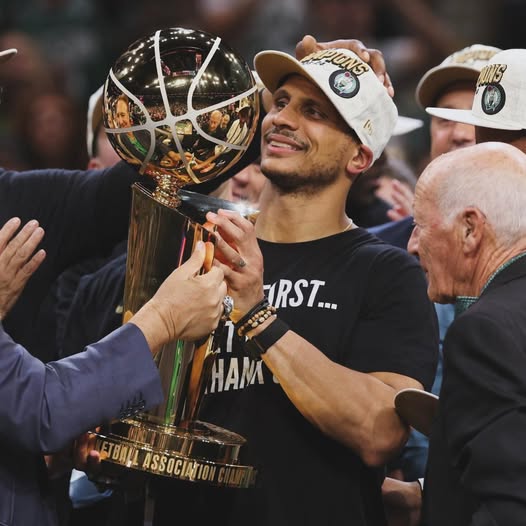Joel Klatt called Notre Dame the premier destination in college football, highlighting its unmatched tradition, passionate fan base, and enduring culture of success.
Joel Klatt’s recent declaration that Notre Dame is the best place in college football wasn’t made lightly, nor was it meant to stir empty controversy. It was a bold affirmation of a program that has long stood at the center of the sport’s tradition-rich tapestry. In a landscape that shifts rapidly due to coaching changes, conference realignment, and the increasing commercialization of college athletics, Klatt’s praise served as a grounding reminder of what makes Notre Dame a constant. His remarks reflect not only admiration for the Fighting Irish’s past but confidence in their future—a future built on the same pillars that have sustained them for over a century.
Klatt pointed to tradition first, a word often tossed around in sports but seldom with such weight. Notre Dame doesn’t just have tradition—it defines it. From the golden helmets gleaming under Saturday lights to “Touchdown Jesus” casting its gaze over Notre Dame Stadium, the entire campus breathes football history. The echoes of Knute Rockne’s locker room speeches and the legacy of icons like Lou Holtz, Ara Parseghian, and Frank Leahy are still felt every time the team takes the field. This is a school where tradition isn’t a marketing gimmick—it’s the lifeblood of the program.
But it isn’t only the history that Klatt emphasized. It’s the consistency of identity. In an era where programs reshape themselves to match the flavor of the month or chase short-term gains, Notre Dame remains Notre Dame. The standards haven’t wavered. The uniforms remain classic. The independent status, long debated in college football circles, is not just a relic—it’s a statement. It affirms that Notre Dame will chart its own course, schedule fearlessly, and maintain its unique brand on its own terms. That independence, Klatt argued, underscores the self-assurance that has always defined the program.
Beyond tradition, Klatt celebrated Notre Dame’s passionate and widespread fan base, a defining feature that sets the program apart. Irish fans are more than just loyal—they are generationally bound to the team in a way that few programs can claim. Whether you’re in South Bend, New York, Los Angeles, or Dublin, Ireland, there are Notre Dame supporters ready to talk football. Game days in South Bend are a cultural experience. The sea of navy and gold, the tailgates filled with family traditions, and the pre-game walk from the Basilica to the stadium—it all feels like a pilgrimage, and for many, it is. There’s reverence to it, and Klatt understands that deeply. He noted that supporting Notre Dame isn’t just a regional affiliation—it’s a lifelong identity.
Part of that fan devotion stems from Notre Dame’s commitment to excellence not only on the field but in the classroom and community. The university has always prided itself on offering the best of both worlds: elite academics and elite football. That dual commitment draws in a special kind of athlete, one who is as determined to be a leader off the field as they are on it. Klatt recognized the rare integrity of that model in a college football world increasingly dominated by NIL deals and transfer portals. While Notre Dame has embraced the evolving nature of the sport, it has done so without compromising its core values. In Klatt’s eyes, that’s something truly worth honoring.
And then, of course, there’s the culture of winning. Critics may point to the lack of a national championship since 1988, but to focus solely on titles is to miss the point. Winning culture isn’t measured only in hardware—it’s measured in expectations, in preparation, in consistency. Notre Dame is nearly always in the national conversation. They win double-digit games regularly. They recruit at a high level. They send players to the NFL. They compete against the best, year after year, with a schedule that’s as tough as anyone’s. Klatt’s perspective reflects a broader understanding of what it means to win—not just on a scoreboard, but in program integrity, in player development, and in national relevance.
Under head coach Marcus Freeman, Klatt sees the potential for Notre Dame to reach even higher. Freeman’s youth, energy, and relatability have resonated with recruits and alumni alike. His ability to connect with players while still maintaining the discipline and standard expected at Notre Dame has reinvigorated belief in what the program can achieve. Klatt didn’t just praise Freeman’s coaching acumen—he praised his understanding of what it means to lead at a place like Notre Dame. It’s not an easy job. The expectations are sky-high, and the scrutiny is constant. But Freeman, in Klatt’s view, is uniquely equipped to handle the challenge with class, purpose, and vision.
Notre Dame’s place in the national landscape continues to be one of intrigue. Despite not being affiliated with a Power Five conference, they command the respect and television exposure of any SEC or Big Ten powerhouse. Their NBC contract, their historic rivalries with USC, Navy, and Stanford, and their willingness to schedule tough opponents each season contribute to a national footprint few others possess. When Notre Dame is good, the sport of college football feels more complete. Klatt’s appreciation for that impact speaks to his deeper understanding of college football’s cultural heart.
He also acknowledged the weight of the Notre Dame helmet. To play for the Irish means something. It’s not a decision made lightly by recruits. It carries academic rigor, athletic challenge, and spiritual growth. Notre Dame isn’t just a football team—it’s a formative experience. Former players return not just with memories of touchdowns and tackles, but with lifelong connections and a sense of shared mission. The Four for 40 slogan—meaning four years at Notre Dame prepares you for 40 years of life—isn’t hollow. It’s lived out in boardrooms, in civic service, in leadership roles across the globe.
Klatt understands that the greatness of Notre Dame isn’t rooted in one era, one coach, or one style of play. It is the cumulative effect of a century’s worth of excellence, heartbreak, redemption, and resilience. He sees Notre Dame as a place where college football still feels sacred. Where the band plays the fight song with the same gusto as it did decades ago. Where the players still tap the “Play Like a Champion Today” sign. Where families drive hundreds of miles each fall weekend because it’s simply what they do. That kind of consistency in a rapidly changing world is rare. Klatt sees it, appreciates it, and isn’t afraid to say it out loud.
His remarks are also a counterpoint to the obsession with trendiness in college football. Programs rise and fall with astonishing speed these days. Coaches are hired and fired in shorter cycles. Brands are built through social media campaigns rather than legacy. In this chaotic churn, Klatt sees Notre Dame as a beacon. A place that doesn’t need to reinvent itself every five years. A program that wins by being who it is, not by trying to mimic others.
Critics might argue that Notre Dame’s stubbornness in some areas—such as conference independence or academic admissions standards—holds it back. But Klatt would likely counter that those very things are what make it special. It’s not about adapting to the masses; it’s about setting your own standard and daring others to meet it. That self-assuredness is the heart of Notre Dame’s identity. It’s the reason recruits continue to commit. It’s the reason fans remain devoted. It’s the reason national analysts like Klatt continue to hold the program in such high regard.
For those outside the program, Klatt’s declaration might feel hyperbolic. After all, college football has no shortage of great venues, passionate fans, and storied legacies. But few can claim all three at the level Notre Dame can. Fewer still can claim it while remaining nationally independent, academically rigorous, and culturally distinctive. Notre Dame does all of it. Every year. Through wins and losses. Through coaching changes and cultural shifts. The program persists, unchanged in its essence, confident in its mission.
Klatt’s words serve as more than a compliment. They’re a call to appreciate what makes college football truly special. In a sport increasingly defined by dollars and deals, Notre Dame remains defined by principles and pride. Its value isn’t just in wins or championships—it’s in what it represents. A pursuit of excellence that doesn’t sacrifice integrity. A love for the game that doesn’t forget its roots. A connection to fans that spans generations and geographies.
So when Joel Klatt says Notre Dame is the best place in college football, he isn’t just talking about stadiums or schedules. He’s talking about a spirit. A legacy. A community. He’s talking about what happens when a football program becomes something bigger than sport—when it becomes a symbol of enduring greatness. And in that sense, it’s hard to argue with him. Notre Dame may not have all the flash of modern programs, but what it has is deeper. More lasting. More meaningful. It is, in every way that counts, the heart of college football.



